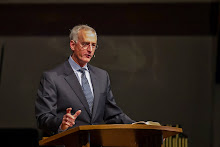Ten Reasons Why Christians Should Focus
More on the Gospel than Politics by Greg
Stier
1.
Politics change. The gospel doesn’t (Matthew 24:35.)
2. The gospel will transform our politics, not vice versa (Romans 12:1, 2).
3. It’s what Jesus calls us to do (Acts 1:6-8.)
4. We are citizens of a different kingdom (Philippians 3:20.)
5. It’s what the early church focused on (Acts 4:23-31.)
6. It attacks the root of evil and not just the fruit of it (Romans 1:16.)
7. Politics can divide the body of Christ while the gospel will unite us (Philippians1:27).
8. The gospel calls us to pray for politicians we disagree with, not hate them (1 Timothy 2:1-4).
9. The gospel brings political action soaked in love and humility, not pride and arrogance (Romans 13:1-8.)
10. Politics are a reflection of the moral compass of a society. The gospel gives society a new compass that is accurate (Titus 3:1-5.)
2. The gospel will transform our politics, not vice versa (Romans 12:1, 2).
3. It’s what Jesus calls us to do (Acts 1:6-8.)
4. We are citizens of a different kingdom (Philippians 3:20.)
5. It’s what the early church focused on (Acts 4:23-31.)
6. It attacks the root of evil and not just the fruit of it (Romans 1:16.)
7. Politics can divide the body of Christ while the gospel will unite us (Philippians1:27).
8. The gospel calls us to pray for politicians we disagree with, not hate them (1 Timothy 2:1-4).
9. The gospel brings political action soaked in love and humility, not pride and arrogance (Romans 13:1-8.)
10. Politics are a reflection of the moral compass of a society. The gospel gives society a new compass that is accurate (Titus 3:1-5.)
*My
point is, not that we should avoid politics as Christians, but that we should
focus more on the gospel (Greg Stier, 10 Reasons Why Christians Should Focus More
on the Gospel Than Politics, The Christian Post, May 16, 2012).
